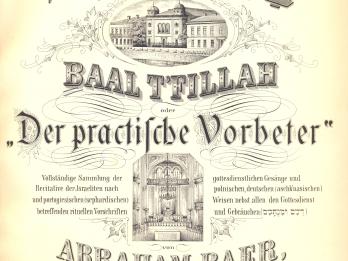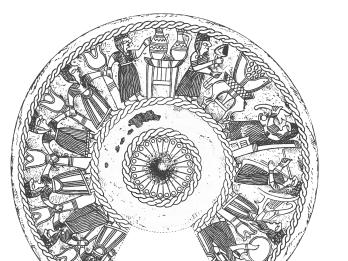Nogah ha-tsedek (Radiance of Justice)
Aaron Chorin
1818
Better still than this is that they should recite the “Verses of Praise,” Yigdal and Adon Olam, and the other exalted prayers on Sabbaths and festivals to the accompaniment of the harp and the sound of melody, so as to broaden and to enthuse the minds of the worshipers for the strengthening of the spirit of the intellect; and indeed, Rema’ [R. Moses Isserles] has already written on [Shulḥan arukh] Ora? ḥayim, ch. 560, para. 3, that, for the purposes of performance of a religious precept, it is permitted to play on musical instruments and all types of nonvocal accompaniment, and by such means, relief and deliverance will arise for us to enable us to remove the great stumbling-block and the obstacle concerning which the greatest of the halakhic decisors, both ancient and modern—peace be upon them—have cried out in protest; for even the congregational readers, who present our prayers pleasantly and eloquently, in a loud voice, so as to enable those who are not fluent in the language of the prayers to fulfill their religious obligation in that regard, and to arouse the hearts of the people to hear about the might of His awesome deeds—blessed be His Name—for from the strictly halakhic viewpoint, we are to appoint as congregational reader only that individual who is the greatest in the community in respect of his wisdom and his deeds; but nowadays, on account of our many sins, their strength resides exclusively in their mouths, and those whose mouths are deficient speak without heart!
But only one with a crooked heart would be so embittered as to claim that the accompaniment of the harp and other musical instruments to the songs of praise in our houses of prayer is prohibited on account of the Torah’s admonition: “You shall not walk in their statutes.” Besides the fact that it is unanimously agreed by all the halakhic decisors that the nations dwelling in Europe are not idol worshipers, as they believe in the majority of the fundamental principles of the Torah of Moses our Teacher—peace be upon him—and they acknowledge the Creator, blessed be He, and His attributes, the most recent of the decisors, from whose words we derive spiritual life, has already written—and this reflects the established consensus—that the prohibition on adoption of the customs of the gentile nations indeed applies only in relation to something that is a custom without any rational basis, where one accordingly has grounds for concern that it is a branch stemming from “a root bearing gall and wormwood,” adopted from the ways of the Amorites. However, something acknowledged as being a matter of renown and praise, and with a taste which is sweet unto the eye of the beholder—for it is the norm for a melody chanted to the accompaniment of musical instruments to be especially adapted for the attainment of an arousal of the soul, which will then fly aloft upon the wings of imagination and desire—that apprehension will overpower everything impeding it, to purify its thoughts and to pour out meditation before the Almighty in dread and awe and in love—that is not included within the category of “the ways of the gentile nations and of the Amorites,” but, on the contrary, it comes under the category of those laws of the gentile nations concerning which was uttered the reproof of Ezekiel the Prophet—peace be upon him—(Ezekiel 5:7), who declared: “You have not walked in My statutes, nor have you performed My laws, neither have you acted in accordance with the laws of the nations dwelling round about you”—and, as R. Joshua, son of Levi, has explained for us (in the Talmudic chapter titled Eḥad dinei mamonot): “This means, in accordance with their well-based norms of conduct.” Ask your father and he will declare unto you, your elders and they will tell you, that such was the position in the days of our prophets, as is explicitly made clear in a number of biblical verses! Should you say: “Such practices were indeed beloved of the Almighty in the days of our ancestors, but nowadays they are detested by Him—have a look, then, at what the position was long before you, in ancient times; even today there is the custom among holy communities to chant at the inauguration of the Sabbath the hymn Lekha dodi to the accompaniment of musical instruments; where the fulfillment of a religious precept is concerned, such as in this instance, it is most certainly permissible to play on musical instruments on Sabbaths and festivals, by employing a non-Jew who has been especially designated for that purpose, as is clearly explained in the comments of the halakhic decisors on Ora? ḥayim, ch. 338 and ch. 339, which do not require to be reproduced here as they are familiar to all.
Credits
Published in: The Posen Library of Jewish Culture and Civilization, vol. 6.




